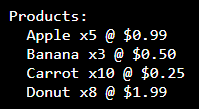Updated April 24, 2023
Definition
snprintf is a standard library function in C programming that writes formatted data to a string buffer. It takes as arguments a pointer to the buffer where the output string is stored, the size of the buffer, a format string, and a list of arguments. The output of the function indicates the exact amount of characters recorded in the buffer, not including the null character. The function guarantees to null-terminate the string, even if the buffer is too small to hold the entire output, ensuring that the output string will not exceed the specified size, thereby avoiding buffer overflows.
Syntax and Parameters
The syntax of snprintf in C is as follows:
int snprintf(char *str, size_t size, const char *format, ...);The parameters of the snprintf function are:
- str: A pointer to the buffer where the output string will be stored.
- size: The size of the buffer, measured in bytes.
- format: A specification that outlines the format of the resulting string. The format string is similar to the one used in the printf function.
- The snprintf() function is included in the <stdio.h> header file.
- …: A list of arguments that correspond to the placeholders in the format string.
The function provides the count of characters recorded in the buffer, not including the null terminator. If the count equals or exceeds the size, then the output has been abbreviated.
Return Values
- The return value of a function is the result that is returned to the calling code after the function has been executed.
- In the case of the snprintf() function, the return value is an int data type and represents the number of characters that would have been written to the buffer if the size limit was not imposed.
- If the output string was truncated due to the size limit, the return value will be equal to or greater than the specified size.
Characteristics of snprintf in C
- Limits buffer size: The snprintf function writes a maximum of size characters to the string buffer, excluding the null terminator, preventing buffer overflows and ensuring the output string will not exceed the specified size.
- Null-terminates output: The function guarantees to null-terminate the output string, even if the buffer is too small to hold the entire output.
- Number of characters recorded: The output of the function specifies the exact amount of characters saved in the buffer, omitting the null termination. If the count is equal to or larger than the size, the output has been shortened.
- Formats data: The function accepts a format string, similar to the format string in the printf function, and a list of arguments, making it a convenient way to write formatted data to a string buffer.
- Can handle dynamic buffer allocation: The function returns the number of characters written to the buffer, which can be used to dynamically allocate the necessary buffer size in cases where the exact size of the formatted string is not known ahead of time.
- Widely supported: snprintf is part of the C standard library and is widely supported across various platforms and compilers.
Examples of snprintf in C
Below are examples to implement the snprintf function in C.
Example #1
Code:
#include<stdio.h>
#include<stdlib.h>
#include<string.h>
struct person {
char name[50];
int age;
float height;
};
int main(void) {
struct person people[] = {
{"John Doe", 30, 1.75},
{"Jane Doe", 25, 1.65},
{"Bob Smith", 40, 1.85}
};
char buffer[100];
int len;
for (int i = 0; i < 3; i++) {
len = snprintf(NULL, 0, "Name: %s Age: %d Height: %.2f", people[i].name, people[i].age, people[i].height);
if (len >= sizeof(buffer)) {
printf("Buffer overflow!\n");
return 1;
}
snprintf(buffer, sizeof(buffer), "Name: %s Age: %d Height: %.2f", people[i].name, people[i].age, people[i].height);
printf("%s\n", buffer);
}
return 0;
}Output:
Explanation:
- In this example, a structured person is defined to store information about individuals.
- An array of person structures is then created and initialized with data.
- The snprintf function is used in a loop to write a formatted string for each person in the array to a buffer, which is then printed to the console.
- The return value of snprintf is checked to ensure the buffer size is sufficient to hold the formatted string, and a warning is printed if the buffer is too small.
Example #2
Code:
#include <stdio.h>
#include <stdlib.h>
#include <string.h>
struct product {
char name[50];
int quantity;
float price;
};
void print_products(struct product *products, int count) {
char buffer[100];
int len;
printf("\nProducts:\n");
for (int i = 0; i < count; i++) {
len = snprintf(NULL, 0, "%s x%d @ $%.2f", products[i].name, products[i].quantity, products[i].price);
if (len >= sizeof(buffer)) {
printf("Buffer overflow!\n");
return;
}
snprintf(buffer, sizeof(buffer), "%s x%d @ $%.2f", products[i].name, products[i].quantity, products[i].price);
printf(" %s\n", buffer);
}
}
int main(void) {
struct product products[] = {
{"Apple", 5, 0.99},
{"Banana", 3, 0.50},
{"Carrot", 10, 0.25},
{"Donut", 8, 1.99}
};
print_products(products, 4);
return 0;
}Output:
Explanation:
- In this example, a structure product is defined to store information about products.
- An array of product structures is then created and initialized with data.
- The print_products function is defined to print a list of products.
- The function uses the snprintf function to write a formatted string for each product to a buffer, which is then printed to the console.
- The return value of snprintf is checked to ensure the buffer size is sufficient to hold the formatted string, and a warning is printed if the buffer is too small.
Advantages of Using snprintf() in C
- The main advantage of using the snprintf function over other string formatting functions like sprintf or strcpy is its ability to prevent buffer overflows. The size parameter of snprintf specifies the maximum size of the buffer, and the function will not write more characters to the buffer than the specified size, thereby avoiding any potential buffer overflows that could lead to security vulnerabilities.
- Another advantage of snprintf is that it provides a convenient way to write formatted data to a string buffer, similar to the printf function, but with the added safety of a specified buffer size. This can simplify the process of creating formatted strings, and make code more readable and maintainable.
- In addition, snprintf can be useful in cases where the exact size of the formatted string is not known ahead of time, as the function returns the number of characters written to the buffer. This data can be utilized to allocate the required buffer size dynamically.
Conclusion
snprintf is a useful function for formatting and writing data to a string buffer in C programming. Its main advantage over other string formatting functions is its ability to prevent buffer overflows by limiting the number of characters written to the buffer to a specified size. The function also provides a convenient way to write formatted data to a string buffer and can simplify code by making it more readable and maintainable. Overall, snprintf is a valuable tool for any C programmer to have in their toolkit.
Recommended Article
In this article, you learned about snprintf in C. To know more about the topic, you can refer to these articles.




